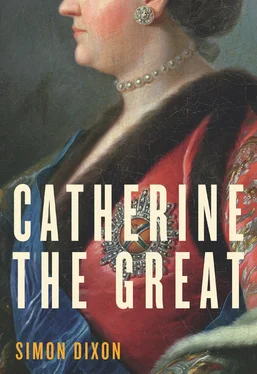Had Grimm accepted her repeated offers of jobs, either during this first visit or on his return to Russia in 1776, when she hoped he might play a leading role in educational reform, their talks might have lasted for longer. As it was, while he accepted a retainer from the empress from 1777, he chose to preserve a degree of independence by returning to Paris in the service of the duke of Saxe-Gotha (who promptly made him a baron). Now they had to pursue their friendship by other means. Since correspondence formed a natural extension of salon conversation in the eighteenth century, they started to write to one another as soon as he left St Petersburg in the spring of 1774. ‘Adieu, monsieur’, Catherine concluded her opening salvo on 25 April, ‘this letter is beginning to resemble our gossip after eight at Tsarskoye Selo, and the fools who read it after you might find it indecent that people as serious as us should write such letters.’ 36It was worth taking care over compositions that straddled the boundary between private and public spheres. The whole correspondence is punctuated by the sorts of self-conscious literary artifice that characterised all such exchanges at the time. 37‘For as long as there have been German barons in the world,’ ran a typical missive from the empress, ‘no one has been so passionately in favour of the post-scriptum as you.’ ‘For my honour and glory,’ she continued on another occasion, ‘I have to tell you that everything that was written above on the 20th of September between dinner and the ball is divine in style and inspiration and the promulgation of a divine communication [from Grimm himself] acting on a mortal brain on a day half cloudy, half rainy. You will see that it is vital for you to know all this for the sake of historical understanding. If anyone ever makes a commentary on this letter, I think the price of paper will go up.’ 38Since there could be no more responsible business than writing for posterity, it was crucial that nothing should fall into unscrupulous hands. Appalled in 1787 that Beaumarchais might include her letters in his edition of Voltaire’s correspondence, Catherine ordered Grimm to buy up every relevant volume and consign it to the flames. ‘And make sure that this objectionable man doesn’t keep a copy, so that having sold it to me, he cannot publish it again.’ ‘Listen, we are all mortal,’ she had written earlier that autumn. ‘Burn my letters so that they cannot be printed in my lifetime; they are much more sprightly than the ones I wrote to Voltaire, and could do the most awful damage; I insist that you burn them, do you understand? Or that you put them somewhere so safe that no one will unearth them for a hundred years.’ 39
Quite how Grimm managed to inspire her to write such revealing letters remains a mystery. His own are deadly dull. Yet somehow he gave her the confidence to rise above conventional generic pleasantries so that her side of the correspondence not only sparkles, but also takes us to the heart of her sensibility. It was to her Parisian ‘whipping-boy’ that Catherine confided some of her most intimate thoughts for the remainder of her life. ‘I think,’ she declared in 1791, ‘that it is decreed on high that you and I have been created expressly so that we may each have a pen continually in hand to write to one another without stopping.’ 40
One reason why Catherine felt so secure with Grimm was that he was generally to be found at the least radical end of the Enlightened political spectrum. Whereas Voltaire was uncomfortably aware that by supporting his heroine’s campaign against the Turks he was not thinking ‘sufficiently as a philosophe ought’, Grimm regarded war as a good in itself because it channelled man’s violent instincts into active, noble virtues. Along with his growing intimacy with Catherine, that was one reason why he was eventually disowned by one of his oldest pacifist collaborators. ‘My friend, I no longer recognise you,’ sighed Diderot, looking back on their time together in Russia. ‘Perhaps without suspecting it, you have become one of the most closet and yet most dangerous anti-philosophes . You live among us, yet you hate us.’ 41
Having been the beneficiary of Catherine’s largesse since she purchased his library in 1765, Diderot was in no position to refuse her invitation to St Petersburg. His arrival on the eve of Paul’s wedding brought the empress into contact with a very different sort of Enlightenment from Grimm’s. For a sixty-year-old with no experience of continental travel, the journey had proved predictably gruelling. Illness had delayed him along the way and continued to afflict him for much of his stay (he drank from the infested waters of the River Neva and ‘paid them the tribute they obtain from all foreigners’). 42The visit could hardly have got off to a less auspicious start when he discovered, to his distress, that the room promised by his friend Falconet was occupied by the sculptor’s artist son, a pupil of Sir Joshua Reynolds. Forced to take refuge at the Naryshkin mansion in St Isaac’s Square, Diderot was a fish out of water at Court, turning up for all the dinners and balls in his little black suit to widespread ridicule and suspicion. Etiquette and intrigue were foreign to him; he had virtually no Russian, though he made desultory efforts to learn some over the course of the autumn; and he made little impact on polite or academic society. Although he and Grimm were elected foreign members of the Russian Academy of Sciences on 25 October, that inauguration was the only meeting he attended, even though a further twenty-six were held before he left for Holland in the following March. Grimm told Mme Geoffrin that it was ‘the only occasion on which I should have been well disposed to see my name alongside that of Diderot’. 43
Catherine, however, was fascinated by him. ‘And with her he is just as odd, just as original, just as much Diderot, as when with you,’ Grimm explained to another Parisian salon hostess, Suzanne Necker. ‘He shakes her hand as he takes yours, he shakes her arm as he shakes yours; but in this last point he obeys sovereign orders, and, as you may imagine, a man does not seat himself opposite to Her Majesty unless he is so obliged.’ 44By the end of October, if not before, they were meeting daily at the Winter Palace. So bored was she with Vasilchikov that Diderot was received at the lover’s hour, after lunch, when he joined her to discuss the essays he presented to her in advance. Happy to borrow an occasional joke from Lev Naryshkin—‘A capital at the edge of an empire is like an animal with a heart at the tip of its finger’—he kept most of these essays short, out of a self-confessed antipathy to ‘purely systematic ideas on serious subjects’. Nevertheless, the empress had encouraged him to write at length and he had no intention of patronising her. Following their disillusion with Frederick the Great, Catherine was the monarch that the philosophes had been waiting for. It was for her, Diderot proclaimed, that Montesquieu has written his great book, The Spirit of the Laws . ‘Your Majesty has a strong mind, a great soul, extensive vision.’ 45
A meeting of minds was nevertheless prevented by the recent radicalisation of Diderot’s political views. In 1765, when Catherine bought his library, he could still reconcile his materialism with his politics by trusting the superior abilities of the ‘great soul’—a wise, absolute ruler surrounded by equally enlightened advisers who could realise the general will by their unique capacity to incorporate in microcosm the social and physiological harmony of the whole species. 46But that confidence had been severely undermined by Chancellor Maupeou’s abolition of the French parlements in January 1771. Though Diderot had little respect for these noble-dominated law courts, they played an important constitutional role in registering the king’s edicts and their abolition was widely interpreted as an act of tyranny. ‘We are on the brink of a crisis which will end in slavery or liberty,’ Diderot warned Princess Dashkova in an apocalyptic letter that April, ‘and if it is slavery, it will be slavery like that which exists at Morocco or Constantinople.’ 47By the time he arrived in Russia, he was already convinced that liberty could be preserved only by a shift of power away from the monarch and towards a representative national body. ‘All arbitrary government is bad,’ he insisted to Catherine, not excepting the ‘arbitrary government of a good, firm, just and enlightened master’. ‘One of the greatest misfortunes that could happen to a free nation,’ he continued, in an essay urging the creation of a permanent representative assembly, ‘would be two or three consecutive reigns of a just and enlightened despotism. Three sovereigns in a row like Elizabeth, and the English would have been imperceptibly led to a condition of servitude of which no one could predict the end.’ 48
Читать дальше












